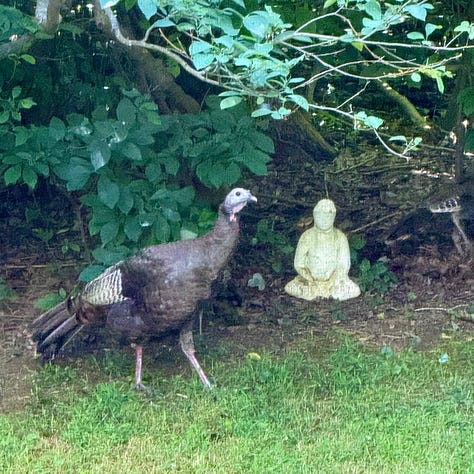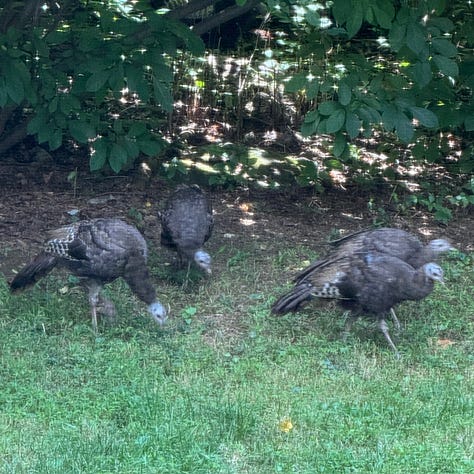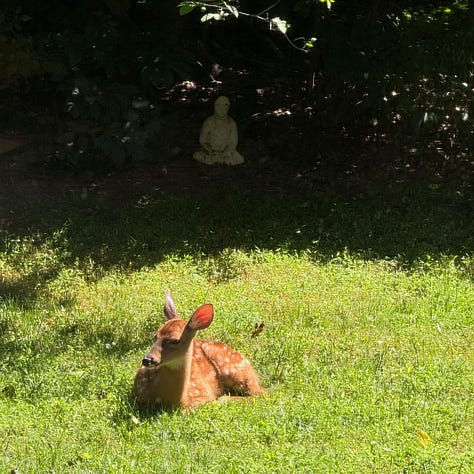This post all started with a song I heard and fell in love with, Transcendental Blues. The lyrics are irrelevant, but the song took me into a deep dive on the concept of transcendence.
Transcend: to rise above or go beyond
Middle English: from Old French transcendre or Latin transcendere, from trans- ‘across’ + scandere ‘climb’.
When I first learned Maslow’s concept of self-actualization around 1970, my reaction was, “That’s what I want to be.” My goal was to be self-actualized. It is defined as “the realization or fulfillment of one's talents and potentialities.” It is considered a drive or need present in everyone. I’ve worked really hard at it over the years.
When we’re young, we are trying to find ourselves. For many, that search can last a lifetime. Comparison to others is the enemy of self-actualization. How many “selves” have you rejected over the years? I can count more than a few. I was certain I was on the right track at the time, but the selves I tried on weren’t a good fit. They didn’t fulfill.
If and when we get on a path, especially one of being an artist or writer, we want to find our voice. False starts, wrong directions, brick walls, lack of opportunity, guidance, motivation, determination, persistence, or waning interest can make you give up.
In both instances, the difficulty we have in finding ourselves and/or our voice is that we are looking for a thing. This thing comes in the form of a point of measurement, a destination, title, award, admiration, or degree.
Just like you find yourself by living, you find your voice by making. It is a long process, and you will not know when you arrive until long after you get there. There comes a slow mounting awareness that you are fully being yourself and expressing how you feel. You found you.
What I didn’t learn at that young, impressionable age was that Maslow added three new tiers to the hierarchy of human needs near the end of his life: cognitive needs, aesthetic needs, and, at the top, self-transcendence. Transcendence typically refers to a heightened or expanded perception or awareness that surpasses ordinary sensory experiences or conventional understanding. It often implies an intuitive or spiritual perception that goes beyond the limitations of the physical senses or rational comprehension.
As difficult as it is to define transcendent experiences, a common characteristic is positive emotions. People report feeling meaning, purpose, serenity, bliss, happiness, joy, calm, peace, and inspiration. With them comes wisdom, insight, growth, and fulfillment. It is not a coincidence that these characteristics also come with age.
Do you want to achieve transcendence? Awe is the emotion of self-transcendence. Rabbi Abraham Joshua Heschel explains it way better than I can. “Awe is more than an emotion; it is a way of understanding, insight into a meaning greater than ourselves. The beginning of awe is wonder, and the beginning of wisdom is awe. Awe is an intuition for the dignity of all things, a realization that things not only are what they are but also stand, however remotely, for something supreme. Awe is a sense for transcendence, for the reference everywhere to mystery beyond all things. It enables us to perceive in the world intimations of the divine, to sense in small things the beginning of infinite significance, to sense the ultimate in the common and the simple: to feel in the rush of the passing the stillness of the eternal. What we cannot comprehend by analysis, we become aware of in awe.”
Infants and toddlers are in perpetual awe. Everything is new and amazing. Eventually, their world (our world) of wonder is full of rules, schedules, and regulated behavior, leaving little time for wonder wandering. Life becomes full of musts - must do, must have, must find; must achieve, acquire, and attain; must produce - must, must, musts. Busy, busy, busy. Those once-fresh eyes become glazed over until, blessedly, we arrive at a certain age and re-discover what matters. We drop the musts, and we come home to ourselves again.
A side benefit of slowing down and being in the moment is that we notice more, which can lead to more awe-inspiring moments. Stitching at my kitchen table last week afforded me two awe and wonder experiences right outside the kitchen door - Mama Turkey strutted by with her flock of 3 or 4-week-old kids and a fawn that munched on a catalpa leaf and then sat down for a wee nap.



I remember sitting in my bed back in my frazzled 1990s, crying at the end of one crazy, long, frustrating day, saying, “I just want to go home, I just want to go home,” over and over. That puzzled me, but it was how I was feeling. I was home, but some part of me recognized that there was something missing.
The Welsh have a word for that feeling: hiraeth. Hiraeth is a pull on the heart that conveys a distinct feeling of missing something irretrievably lost. Now I know what I meant. I had lost myself. I know that now because I feel at home with and in myself. This slowing down experience that comes with age is truly a gift. It allows for time to experience wonder and awe again. These life journeys we are on are universal, not unique. I’m reminded of Glenda the Good Witch telling Dorothy (who was also trying to get home), “You’ve always had the Power, my Dear. You just had to learn it for yourself.” I didn’t get the true meaning then, but over the years, it became more clear. It wasn’t until I stopped trying and started being that I found my way home.
I think I have finally self-actualized. Hmm, have I achieved self-transcendence yet? I don’t know. But I am definitely working on it.
Quotes of the Week
Wisdom begins in wonder.
Socrates
Observe the wonders as they occur around you. Don't claim them. Feel the artistry moving through and be silent.
Rumi






This was very moving. Thank you ! I was hoping it was going to be a gathering....
I love the work Maslow shared with the world, although some of it has been questioned. I listed the hierarchy in my journal sometime last year. My goal was to reach that top level. Sometimes I feel close to transcendence!
The beauty of being a “certain age “ is that we have the freedom to cast aside whatways us down. When we do that; we open ourselves up to the spiritual experience, the sense of awe that is always available.